Fifth-wheel camper trailers are known for their stability and ease of towing, making them a popular choice among RV enthusiasts. If you’re considering whether a fifth wheel is easier to tow compared to other RV types, this guide will help you understand why they often provide a smoother towing experience. By following means a person will be able to know the fact that are fifth wheels easier to tow.
Why Fifth Wheels Are Easier to Tow
Superior Hitch Design
The unique hitch design of fifth-wheel trailers, which mounts over the truck’s rear axle, provides enhanced weight distribution. This setup minimizes sway and ensures greater control, especially during high-speed or windy conditions.
Enhanced Stability
Fifth wheels are inherently more stable due to their connection point inside the truck bed. This reduces the risk of trailer sway, a common issue with travel trailers that connect at the bumper.
Improved Maneuverability
Thanks to their hitch placement, fifth wheels offer a tighter turning radius. This makes it easier to navigate sharp turns, back into campsites, and maneuver through tight spaces.
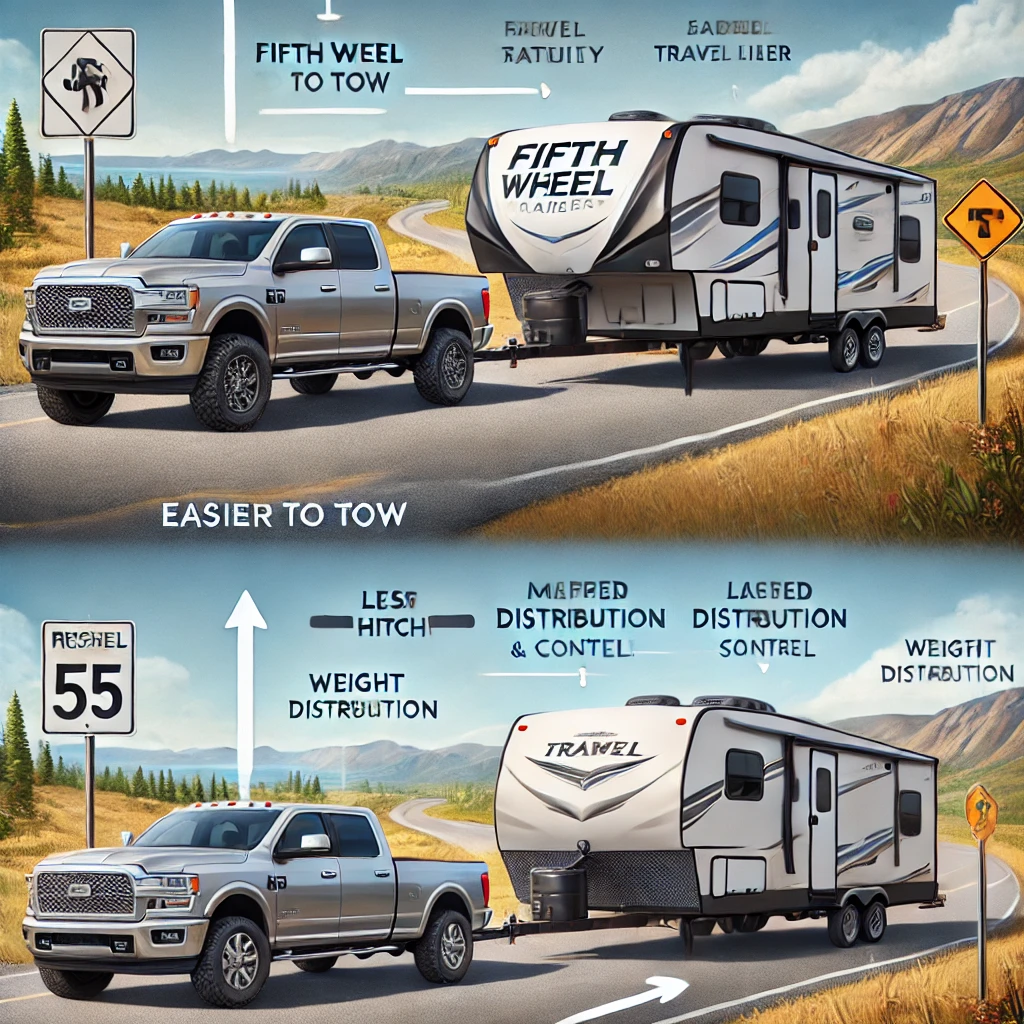
Considerations When Towing a Fifth Wheel
Truck Requirements
You’ll need a truck capable of hauling a fifth-wheel trailer, as smaller vehicles aren’t compatible. The added stability and control make the investment worthwhile for many RV owners.
Learning Curve
While towing a fifth wheel is easier in the long run, beginners may need some practice to get comfortable with hitching and backing up the trailer.
Weight and Size
Fifth wheels are often larger and heavier, so ensure your truck’s towing capacity matches the trailer’s weight.
Why Fifth Wheels Are Worth It
In summary, fifth wheels are easier to tow for most people due to their stable hitch design, reduced sway, and better maneuverability. With proper preparation and the right truck, you’ll enjoy stress-free towing on your RV adventures.
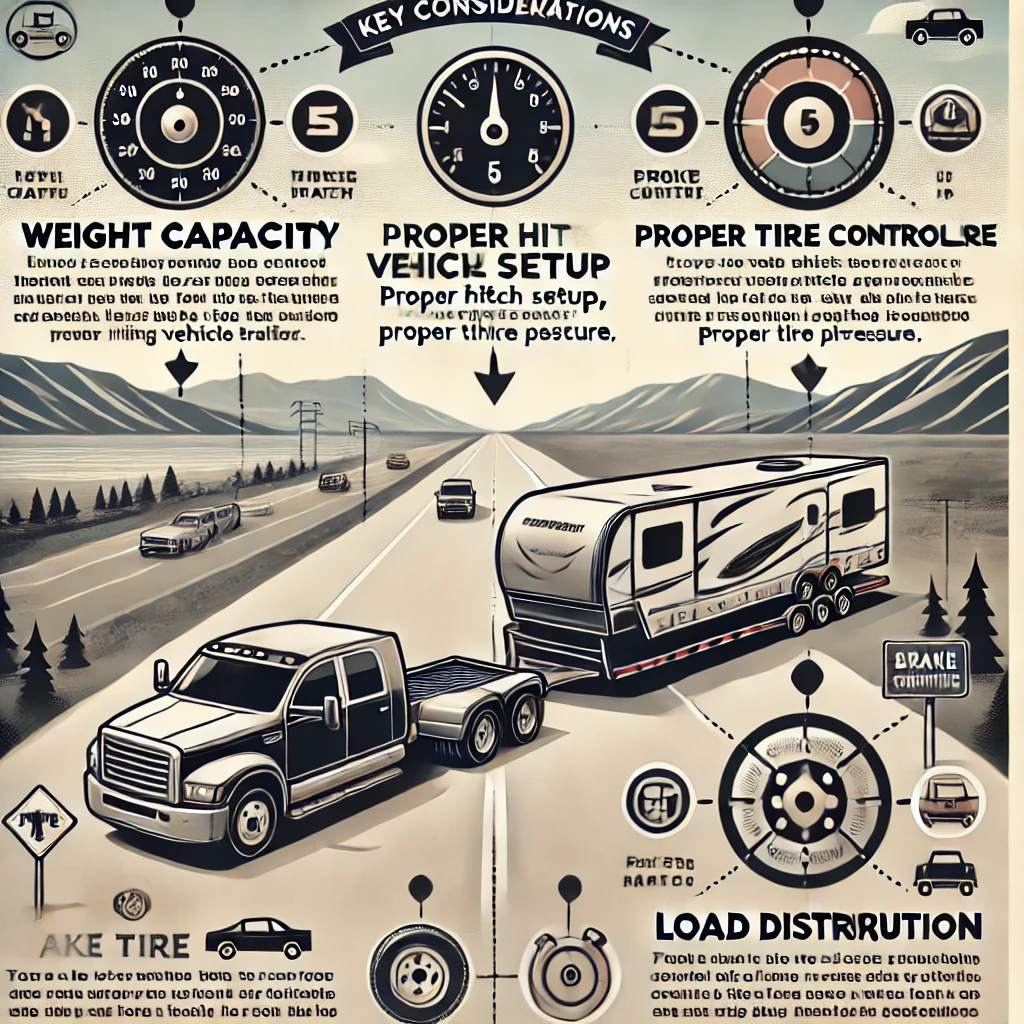
Steps to Determine if Fifth Wheels Are Easier to Tow
Understanding the process of towing a fifth-wheel camper trailer can help you decide if it’s the right choice for you. Below are the key steps to evaluate why fifth wheels are often considered easier to tow compared to other types of RVs.
Step 1: Understand the Hitching System
Learn About Fifth-Wheel Hitches
Fifth wheels use a specialized hitch mounted over the rear axle of a truck. This design ensures better weight distribution and reduces trailer sway. Understanding this system is crucial for appreciating why towing feels more stable.
Compare with Bumper-Pull Trailers
Unlike traditional bumper-pull trailers, the hitch placement of fifth wheels creates a central pivot point, giving you more control, especially during tight turns or adverse weather.
Step 2: Assess Truck Compatibility
Check Your Vehicle’s Towing Capacity
Ensure your truck is equipped to handle the weight of a fifth-wheel camper. Most fifth wheels require heavy-duty trucks with a specific towing setup.
Install the Proper Hitch
Work with a professional to install a fifth-wheel hitch in your truck bed. Proper installation is vital for ensuring safety and ease of towing.
Step 3: Practice Maneuvering and Towing
Start with Open Spaces
Before hitting the road, practice towing and backing up your fifth wheel in an open area. This will help you get comfortable with its turning radius and maneuverability.
Master Reversing Techniques
The hitch placement of fifth wheels allows for tighter turns, but reversing can take practice. Use spotters or backup cameras for additional guidance.
Step 4: Consider Road Conditions and Travel Plans
Plan Your Routes
Fifth wheels are larger, so it’s essential to map out routes that accommodate their size. Avoid narrow roads or low-clearance bridges.
Check Weather Conditions
The stability of fifth wheels is an advantage in windy conditions, but always drive cautiously and stay aware of changing weather patterns.
Final Thoughts:
By following these steps, you can experience the benefits of towing a fifth-wheel trailer. Their superior hitch design, enhanced stability, and smoother towing make them a reliable choice for long journeys. Proper preparation ensures a safe and enjoyable adventure every time.
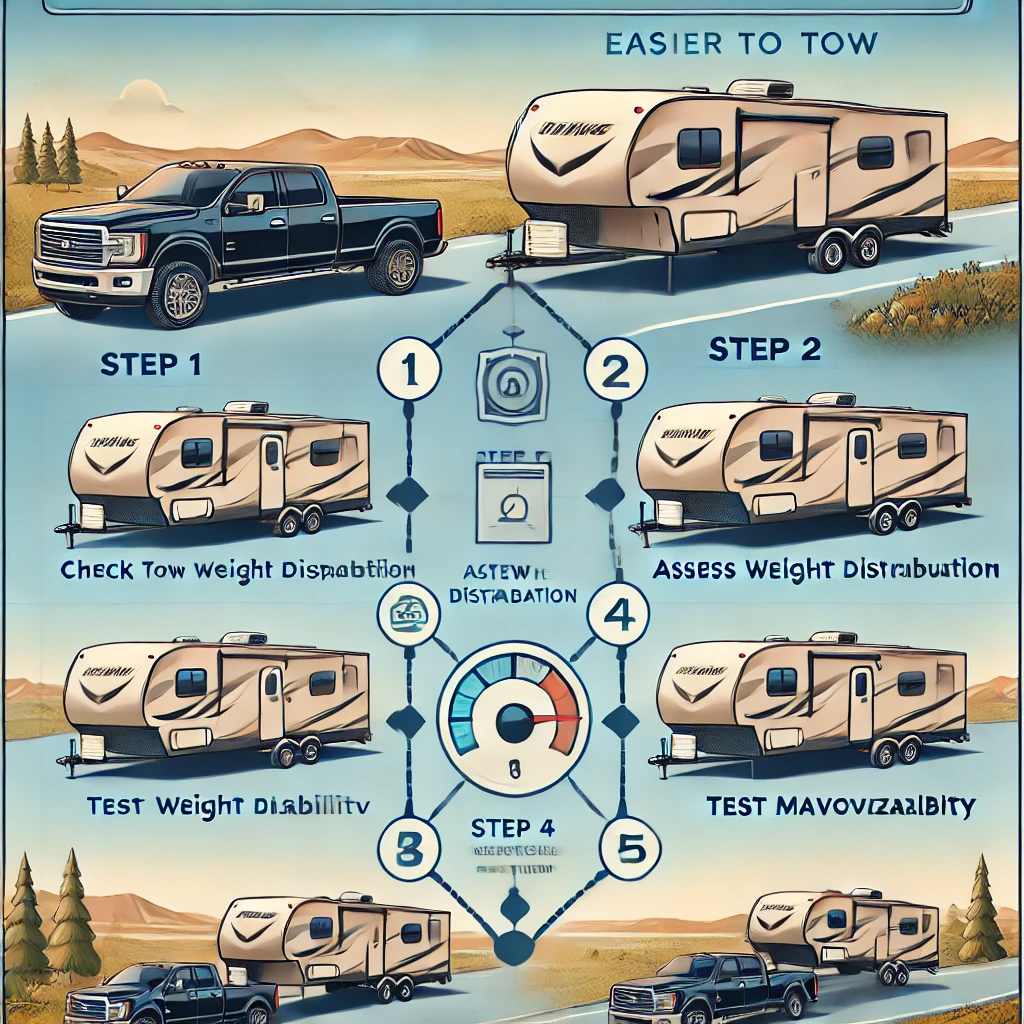
Tools Needed for Towing a Fifth-Wheel Camper Trailer
Towing a fifth-wheel camper trailer requires the right tools and equipment to ensure safety, stability, and ease of use. Below is a detailed list of essential tools you’ll need for a successful towing experience.
Fifth-Wheel Hitch Components
Fifth-Wheel Hitch
The most critical tool, a fifth-wheel hitch, is installed in the truck bed and connects the camper trailer to the tow vehicle. Choose a hitch compatible with your trailer’s weight and your truck’s specifications.
Mounting Rails
Mounting rails secure the fifth-wheel hitch to your truck bed. Professional installation is recommended for safety and durability.
Truck and Trailer Connection Tools
Kingpin Lock
A kingpin lock prevents theft by securing the trailer’s kingpin when it’s not hitched to your truck.
Safety Chains and Breakaway Cable
These are vital for added safety. The breakaway cable activates the trailer brakes if it disconnects from the truck, while safety chains provide an additional connection.
Weight and Stability Tools
Trailer Brake Controller
A brake controller ensures synchronized braking between your truck and the fifth wheel. It’s essential for safe stops, especially with heavy loads.
Torque Wrench
Use a torque wrench to tighten bolts and nuts, ensuring all components are secure. Proper torque prevents accidents caused by loose connections.
Convenience and Maintenance Tools
RV Leveling Blocks
Leveling blocks help keep your fifth-wheel trailer steady when parked on uneven surfaces.
Hitch Lube Plate
A hitch lube plate minimizes friction between the hitch and the trailer’s kingpin, reducing wear and tear.
Backup Camera
A backup camera simplifies the hitching process and enhances visibility when reversing your trailer.
Safety and Emergency Tools
Tire Pressure Monitoring System (TPMS)
A TPMS monitors your tires’ pressure, ensuring optimal performance and preventing blowouts during travel.
Emergency Roadside Kit
Carry an emergency kit with flares, reflective triangles, and basic tools to handle unexpected breakdowns.
Equip Yourself for Safe Towing
Having the right tools for towing a fifth-wheel camper trailer ensures a smooth and stress-free journey. With proper preparation and these essential tools, you’ll enjoy safer and more enjoyable adventures.
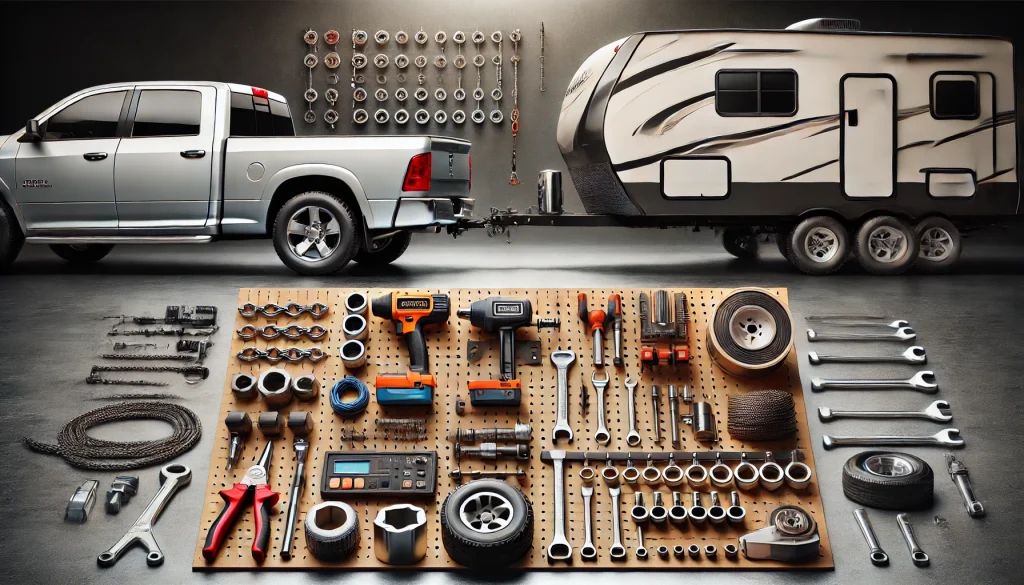
How to Tow Different Classes of Fifth-Wheel Camper Trailers
Towing fifth-wheel camper trailers requires understanding their various classes and adjusting your approach based on size, weight, and features. Whether you have a lightweight model or a luxury fifth wheel, this guide will help you tow with confidence.
Lightweight Fifth Wheels
Features of Lightweight Fifth Wheels
Lightweight fifth wheels typically weigh under 10,000 pounds and are designed for mid-size or half-ton trucks. Their compact size makes them ideal for beginners and smaller towing vehicles.
Towing Tips for Lightweight Fifth Wheels
- Ensure Proper Weight Distribution: Although lighter, these trailers still require careful balance. Load evenly to maintain stability.
- Use a Compatible Hitch: A lightweight fifth-wheel hitch is sufficient and easier to install compared to heavy-duty models.
- Practice Maneuvering: These trailers are more responsive, so practice backing up and turning in open areas.
Mid-Range Fifth Wheels
Features of Mid-Range Fifth Wheels
Mid-range fifth wheels weigh between 10,000 and 15,000 pounds and often include more amenities, such as slide-outs and full kitchens. They require three-quarter-ton trucks for safe towing.
Towing Tips for Mid-Range Fifth Wheels
- Check Towing Capacity: Verify that your truck can handle the combined weight of the trailer and its contents.
- Install a Brake Controller: Mid-range fifth wheels need a high-quality trailer brake controller to ensure smooth stops.
- Adjust for Height and Clearance: Use an adjustable hitch to keep the trailer level and avoid clearance issues with the truck bed.
Luxury Fifth Wheels
Features of Luxury Fifth Wheels
Luxury fifth wheels weigh over 15,000 pounds and are equipped with high-end amenities like multiple slide-outs, large living spaces, and advanced technology. Heavy-duty one-ton or dually trucks are required for towing these models.
Towing Tips for Luxury Fifth Wheels
- Invest in a Heavy-Duty Hitch: A premium hitch designed for heavy loads ensures a secure connection.
- Monitor Tire Pressure: Use a Tire Pressure Monitoring System (TPMS) to keep the trailer and truck tires at optimal levels.
- Plan Routes Carefully: Luxury fifth wheels are longer and taller, so choose routes with wide roads and avoid low-clearance areas.
Tailoring Your Towing Approach
Each class of fifth-wheel camper trailer has unique towing requirements. By understanding the size, weight, and features of your trailer, you can make adjustments for safe and comfortable travel. With proper equipment and preparation, towing any class of fifth wheel becomes a straightforward and enjoyable experience.
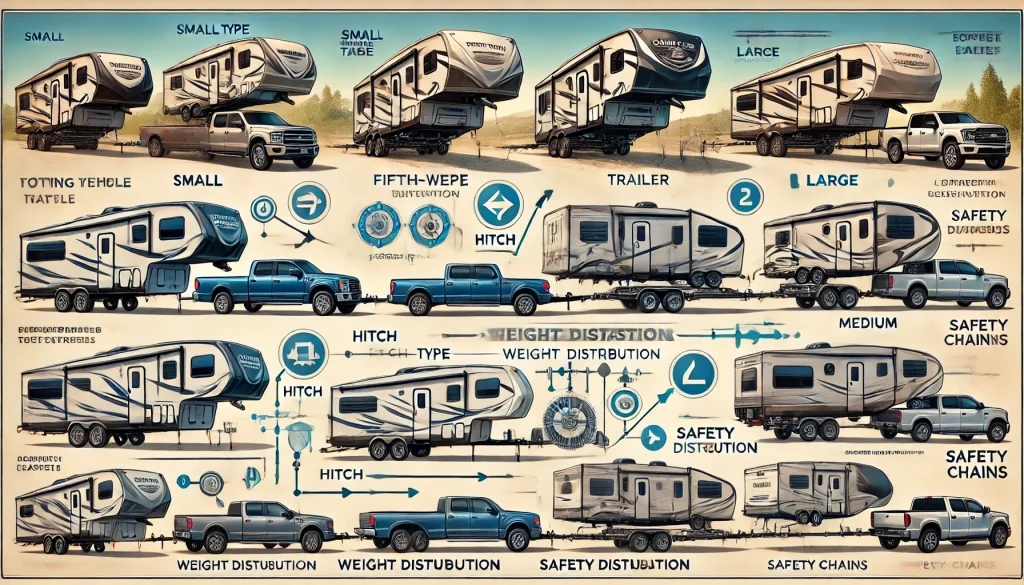
Common Mistakes When Towing a Fifth-Wheel Camper Trailer and Their Solutions
Towing a fifth-wheel camper trailer can be challenging, especially for beginners. Avoiding common mistakes and knowing their solutions ensures a safer and smoother experience on the road. Here are some frequent mistakes people make when towing a fifth wheel, along with practical solutions to fix them.
Mistake 1: Overloading the Fifth Wheel
The Problem
One of the most common mistakes is exceeding your fifth-wheel camper’s weight limits. This can strain your vehicle, increase the risk of accidents, and cause damage to your trailer and truck.
Solution
- Check the Gross Vehicle Weight Rating (GVWR): Always verify your fifth wheel’s GVWR and ensure your load, including passengers, fuel, and cargo, stays within the limit.
- Distribute Weight Evenly: Properly balance your load to avoid uneven pressure on the trailer, which can cause swaying.
Mistake 2: Using the Wrong Tow Vehicle
The Problem
Using an underpowered truck to tow a fifth wheel can result in poor handling, difficulty braking, and even mechanical failure.
Solution
- Match Your Truck to Your Trailer: Ensure your truck’s towing capacity matches the weight of the fifth wheel you plan to tow. For heavier trailers, consider upgrading to a heavy-duty or dually truck.
- Consult the Manufacturer’s Guide: Always refer to your truck and fifth wheel’s manuals for weight and towing guidelines.
Mistake 3: Incorrect Hitch Installation
The Problem
Incorrectly installing the fifth-wheel hitch can lead to poor trailer stability, making it difficult to tow and increasing the chances of an accident.
Solution
- Get Professional Installation: If you’re unsure about installing the hitch yourself, have it installed by a professional. This ensures it’s correctly positioned and securely mounted.
- Double-Check Connections: Always double-check that the hitch is locked, and perform a “pull test” to ensure the connection is secure before driving.
Mistake 4: Ignoring Tire Maintenance
The Problem
Neglecting tire maintenance on both the truck and the fifth wheel can lead to blowouts or poor fuel efficiency, especially during long trips.
Solution
- Check Tire Pressure Regularly: Use a Tire Pressure Monitoring System (TPMS) to monitor pressure and avoid blowouts.
- Inspect for Wear and Tear: Before each trip, inspect your tires for signs of wear, cracks, or uneven tread patterns, and replace tires as needed.
Mistake 5: Not Practicing Before Hitting the Road
The Problem
Jumping straight into a road trip without practice can lead to issues when maneuvering, especially in tight spaces or when reversing.
Solution
- Practice in an Open Area: Take your fifth wheel to an empty parking lot to practice turns, backing up, and navigating through tight spots.
- Use a Backup Camera or Spotter: Install a backup camera for easier navigation, or have someone guide you when reversing.
Mistake 6: Forgetting to Check Road and Weather Conditions
The Problem
Ignoring road or weather conditions can result in hazardous towing situations, such as poor traction or inadequate clearance for your fifth wheel.
Solution
- Plan Your Route in Advance: Check for road conditions, clearances, and any restrictions for large vehicles. Avoid narrow roads or low bridges.
- Monitor Weather Forecasts: Always be aware of changing weather conditions, and avoid driving in heavy winds, snow, or rain whenever possible.
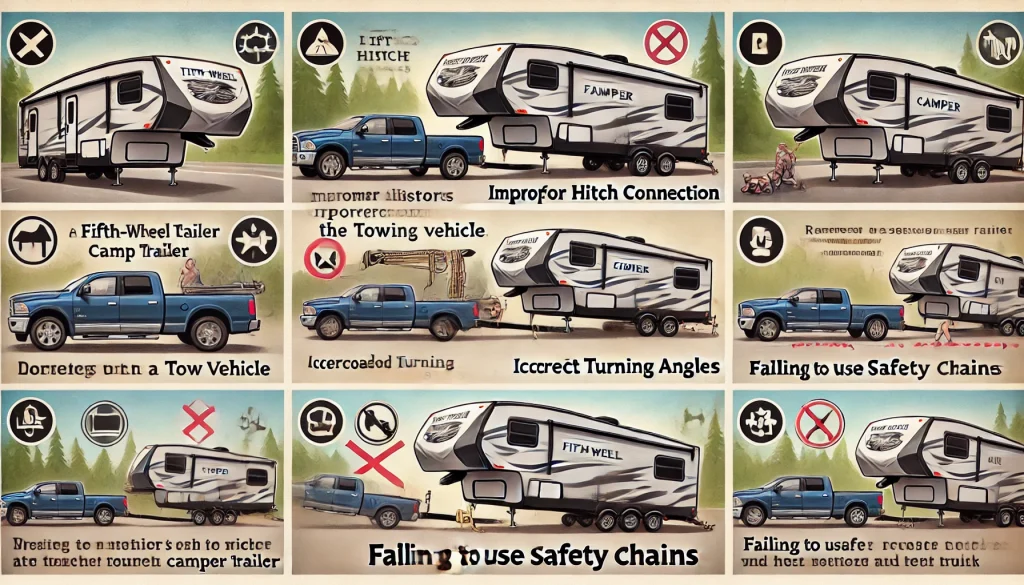
Conclusion
By addressing these common mistakes and implementing the solutions above, you can significantly improve your fifth-wheel towing experience. Proper planning, regular maintenance, and practice will ensure safe and enjoyable travels on the road.
More related information will be available on Flamingo Motorhomes.

